Serendipity, picking Viet Thanh Nyugen’s memoir, A Man with Two Faces as the main book for the memoir writing class I am teaching. Last time it was Liar’s Club and Wild and other things to haunt the student with other writers’ haunting memoirs.
Mary Karr and Cheryl Strayed, and the students learned about all sorts of ins and outs tied to those two women’s memoirs. There is countless ink on Mary and Cheryl and endless YouTube uploads of them talking, being interviewed and giving memoir writing tips to selected and wide audiences.
Before I tackle Viet, here, some dabling of mine over at Dissident Voice: Leaning into Memoir Writing in Order to “Know” — Remembering is an Act of Survival!
Even my ranting gets some attention, as I did receive a memoir from Robert W. Norris, The Good Lord Willing and the Creek Don’t Rise , for consideration, and I indeed reviewed it and intersected into it here: A Kid in California Heading to the Brig — A personal journey of love for a strong mother to the land of the rising sun and a new pathway out of conscientious objector status.
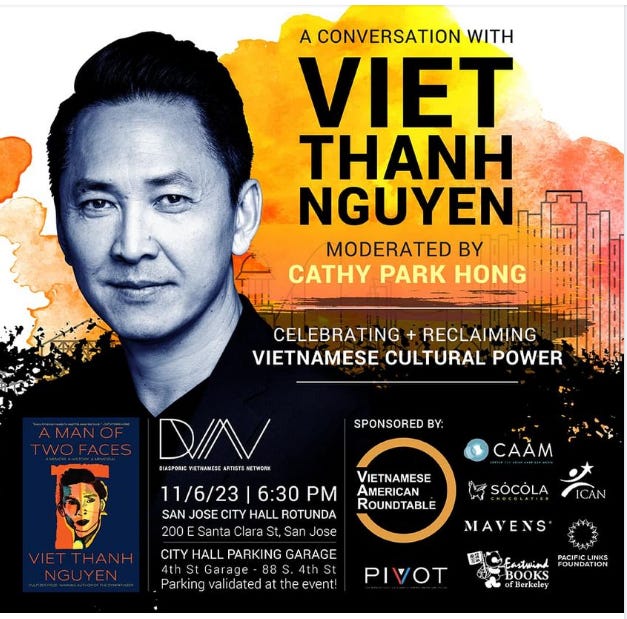
Patience: All I have now is my quickly decaying mind and this platform from which to scream bloody murder, so I’ll get into Viet’s book after I splay the digital page with one of my essays, with is in Cirque Journal and other places:
Hell, here’s one long ass published memoir essay:
Wrestling the Blind, Chasing Apache Horses, and Unpacking the Vietnam War
by Paul Haeder / September 4th, 2013
They carried all they could bear, and then some, including a silent awe for the terrible power of the things they carried. — Tim O’Brien, The Things They Carried
“What was the last best memory you have of your father?” There were eight of us, encircling him, when he asked me to recall that moment I knew my father to be at his most vulnerable point for me, his most unadorned human self. For Robert Bly, he was asking me when I first saw myself as strong (or stronger than my old man).
Bly was tired, the wild man in his Iron John wilted by age, still angular, white as snowy full-head of hair, but taxed by the expressway of poet on call to shunt the drums of war, asked to explain the smear of Abu Ghraib, and his call to duty to fight against the ideology of “war is peace” that was just getting whipped up like an unholy dust devil across his America.
To just step back a bit, I have to admit now that it’s always been my “call to duty” to be in the thick of things, to be this guy having these constant little brushes with fame. Since I was 18 . . . well, 16 if you count being an extra in a motorcycle movie with Ann Margaret and Joe Namath. Or riding away from the camera and Charlton Heston in a cowboy flick shot at Old Tucson. Once in my early twenties, I had the chutzpah to drive up to Lee Marvin’s house in Tucson and plop down my own screenplay into his hands and pitch the idea while playing tennis with him in my jeans and Tony Lamas. From Linda Ronstadt kissing me on my forehead when she arrived at one of her aunt’s house (good friend of my mom, and that day I had begged to learn how to grind corn and mold it all into green corn tamales), to Tom Waits drinking beer and smoking a blunt in the back of my VW bug after he finished a concert in Tucson, I’ve had these odd intersections with famous sorts of people.
Willie Nelson and James Crumley hoisting a few Patron’s with me near Hondo, New Mexico, at Andrew Wyeth’s place. Mashed potatoes, Swiss steak and a plate-full of peas in an El Paso cafeteria with Cormac McCarthy. “This is a story . . . a book, not fragments,” Tim O’Brien insisted while smoking a Camel outside Chope’s near Las Cruces. “Just plow through those weird little occurrences, and you’ll see the memories will start sprouting . . . goddamned different every time. Then you’ll have a book.”
I’ve always been what my thesis advisors or mentors and friends called “the handler,” or the “go-to-kid” with the ability to be older than he was, and to somehow be Every Man/Every Woman’s kid brother . . . or son. I was that twice for Kurt Vonnegut. Twice for Denise Levertov. Once for Octavio Paz and Gabriel Marquez.
Fast forward thirty years. This time, my second brush with Bly, stuck in Spokane on a Saturday, after his poetry reading to a few hundred. Robert Bly needed a post-reading tight one. He was tired, but it only took a few prods and two drinks to get him to actually remember me 21 years earlier. That was 1985. Juarez, Chihuahua. A big group of about ten hangers on mentally gyrating that overtly ga-ga-ing thing for the famous bard inside a restaurant. It was my fault, really, since I arranged the place, the crowd, and mescal spirits liberally passed around. I remember four young women – girls, really – from a private college who sang corridas with the 10-piece mariachi band. Bly was completely taken by their voices.
Let’s move back, err, forward in this case, to April, 2006. Bly had just published The Insanity of Empire, and the tannin of Bush’s war was thick on his lips as he entranced the crowd at the community college and then challenged them to remember their own call to duty:
Tell me why it is we don’t lift our voices these days
And cry over what is happening. Have you noticed
The plans are made for Iraq and the ice cap is melting?I say to myself: “Go on, cry. What’s the sense Of being an adult and having no voice? Cry out! See who will answer! This is Call and Answer!”
Again, Bly and me, this time 1,600 miles further north than the last time I shared rounds with him. He remembered Juarez, the reading in El Paso, and the Juarez band and that brotherhood and sisterhood of people who had arranged his appearance at the university. And Bly remembered me.
He wasn’t going to give up his question: “No, really, this is an important one . . . for men to know when that point occurs in their relationships with a father.” After a couple of bourbons, Robert Bly seemed to be saying to me it was okay if I just carried on a one-on-one with him at this pub called Catacombs. He repeated how he liked my militancy. He had read the piece I just published in the weekly “not just announcing my reading, but taking it to a higher level of consciousness by putting the you into the narrative.” He also wanted to know what it was like to be the son of a military man who not once but twice went to Vietnam as a career officer.
I pulled from his book, Iron John, widely read and widely disempowered by critics:
The older men in the American military establishment and government did betray the younger men in Vietnam, lying about the nature of the war, remaining in safe places themselves, after having asked the young men to be warriors and then in effect sending them out to be ordinary murderers.
“From the sound of it, your father was smart. Well read. College degrees. Yet he was in two wars. Korea. Then Vietnam. How does his military – his war experience — best inform you? Someone who in a mere few minutes has illustrated to everyone around this table that he is more than just a man’s man, more than just a Renaissance man. An adventurer. Going it alone in Central America. Going to Vietnam ten years ago to experience something locked inside his father. It’s important to know that moment when you first realized your dad’s humanity . . . and knew his fear.”
Desert
“I’m just going to eat rice . . . I need to get to one-forty. I’m tired of wrestling up so much, dad.”
We were following the yellow bus, two of my buddies, Schwam (138 lbs.) and Molina (125 lbs.), were crashed in the back of the 1965 bug. I was driving on a learner’s permit.
My old man seemed small next to me, skinny, his blonde hair receding dramatically in the past few months. He had dropped twenty pounds so he might make it easier on his banged up body for his second spin in Vietnam. Age 36. Already shot once. Airlifted out with a Huey co-pilot gravely wounded and the pilot zipped up in a KIA bag.
He was proud of me, even in my youthful militancy. I was really tanned, brown. Angular. Muscular. He liked it that I had college on my mind even as a freshman. Proud I was wrestling varsity at 15 years old.
“How’d you learn all that mechanical stuff?” he’d ask me while watching me retool, tune up and strip down my Bultaco and Husky motorcycles. “Funny how you never took to learning German, with your Tanta Emmy and Grandma Frieda around when you were a kid. Spanish! How’d you pick that up so quickly?”
Then he’d launch in on West Point, on some Republican senator my mom knew who might send in some appointment recommendation for me to be accepted to the Academy. Here we were hitting 65 mph, entering some of my favorite places — Upper Sonoran Life Zone, then into the Transition Life Zone. Those Desert-Grassland and Desert Riparian zones. And I was hating every last image of war and Nixon and Kissinger I ever saw in print and on TV.
He launched into why General Westmoreland was misunderstood, why Dick Nixon was even more misunderstood: “ . . . inherited a messed up war strategy from President Johnson.” One loud fight after another recalled. Strange, really, how my old man, Chief Warrant Officer Four Marvin Haeder, ended up trying to convince me of something righteous about the military, or why the USA bombing, spraying, immolating and raping Vietnam was “the right policy.”
I was obsessed with post-flashflood arroyos packed with javalina, entranced by the evenings of the a thousand tarantulas, completely taken by the dawns of one hundred zombie bufo alvaris – Sonoran Desert toads.
My old man would be in some classroom or on some mountaintop messing around with radio towers, signal relays, his secret codes while I was into the wild, launching myself into a riot of reptiles, arachnids and mammals.
While my old man showed me black and white photos of his signal corps outposts in Vietnam, images of these denuded jungle camps with eerily happy blacks, Latinos and an array of white men, I was already talking desert green toads, talking about monsoon bursts near Sedona when a thousand western narrowmouth toads appeared unbending from their 10-months suspended animation.
Snakes
Wrestling for me was a way to be as good as any warrior, tin soldier. To stay in shape for three- and five-day hikes into vast expanses Indian Country, land anywhere close to a river or drainage. Like the ones we were near — the San Pedro River drainage that passes along the Pinal Creek en route to the Salado River. My old man talked about logistics, cryptographic mumbo-jumbo, Barry Goldwater while I waxed on and on about these ancient routes, in use from 1100 to 1450 AD. The pueblos on Pinal Creek were once cosmopolitan trade centers with exports of ground pigments, turquoise, beads, and ceramic bowls. Shells from the Gulf of Mexico, the Pacific Ocean and the Gulf of Mexico.
“Your grandfather was fleet champion twice. One hundred and ninety pounds. In the Kaiser’s navy, before he became a pilot. Halberstadt CL- IV’s he piloted. Bi-planes. He would have been proud of you, though.”
Here I was, making a run through Sonora Desert , Highway 77 – the back way to Globe-Miami from Tucson, from my high school parking lot. My two buddies out like logs, and my father — three weeks from his second tour in Vietnam — bringing up my grandfather, the Iron Cross man, big WWI ace, émigré to Iowa in 1921. Failed farmer. Bread truck driver. Failed restaurant owner. The big man with mitts like Babe Ruth’s, his namesake, me, his pride and joy as he lumbered still a hard man in his last gasps with emphysema.
I slowed to a stop as I watched a seven foot bull snake move slowly into a caliche-etched gully cut-bank. “Come on Paul,” my old man pleaded as he saw me scramble over prickly pear, over dried-out saguaro ribs, blasting my body and arms into a bunch of rocks. “Rattlers out here,” he said. “Come on, Paul, be careful.”
Of course, he was wrong. There weren’t rattlesnakes moving around midday at the foot of Pinal Mountain. But the bull snake, hell, I just had to grab it, break up the monotony of the trip to our wrestling match, scare the crap out of Schwam and Molina in the back who were still nestled in with the camping gear my old man absconded from Fort Huachuca for our post-wrestling match bonding fishing trip on the west fork of White River in Apache country.
“Jesus, Paul. Stop.” I put the seven foot snake’s face into the car while my Big Red One Infantry regular army dad, with one tour in Korea as a 19 year old, one in Vietnam two years ago, one more about to be unleashed, complained like a whiny kid brother.
“If you’re afraid of this, Chief, what the heck are you going to do with the three-step viper . . . the ground cobras?” I was a smart ass, know it all, to be sure, but I was stealth, quick to know the flora and fauna of Sonora, all of Arizona, and way into Mexico. Quick to speak Spanish with my Mexican friends. Always camping with older guys, some of whom were former Vietnam War draftees who taught me about motorcycles, endless tracks of desert roads to nowhere/everywhere, and about how rotten the war was.
By the time I was 15, my father didn’t really know me. He was always gone, at schools for his cryptographic signal corps crap: Fort Rucker, Alabama; Fort Huachuca, Arizona; Fort Gordon, Georgia. He had pressed uniforms, spit-shine shoes, shiny pips and his array of ribbons all lined up via small wooden ruler.
His son with the shoulder-length mop of hair, on the other hand, had his terrariums loaded with geckos, five species of scorpions, horned toads, red racer snakes, gopher snakes, California Kings, and any injured animal he’d run across.
Bad language
It was a story of crossed DNA. My working mom gave me a long leash since I was an A student in school. Never sweating (overtly) me driving my sister’s 750 Honda at age 13. One spring break, I ended up with Navajo and Mexican friends outside of Chinle and then two weeks hiking Canyon de Chelly. At age 14. Learning what all middle school kids should learn – Arizona is not a white man’s invention.
Canyon de Chelly, a screwed up Spaniard’s mishearing of the Navajo, Tséyi, which means “inside the rock,” not canyon like white boys and girls are told. The very concept of language as a frame of self, the defining binder for culture — that inside the rock was deeper and more in tune with larger existential quandaries than the mere idea of “canyon” – floored me.
Here I was, with my old man, maybe for the last time since he was going to the killing fields of his Vietnam, the war, not the country. He was waxing nostalgic about the Army, about European history, about the Vaterland , and his weird breaking into song, Das Lied der Deutschen, our family tours in France and Germany, while I cranked up Black Sabbath on the eight-track and watched for brown eagle shadows and the first signs of desert spring bloom.
What a Mutt and Jeff routine – my blond and blue-eyed old man with aspirations for a son named after his war hero father going into the military vis-à-vis the Academy. This 5 foot nine 15-year-old brown hair and brown eyed recalcitrant son with the Afro who spoke Spanish, went out with Mexican girls, and preferred tamales and empanadas to Wiener schnitzel and strudel.
I hated the Vietnam War. Hated the war lovers in my high school. It was 1972, I was 15, and way beyond my years politically compared to most of the guys wrestling with me and slogging through high school. Canyon del Oro High School. Gold Canyon. We were the Dorados. Crazy shit. Dorados.
So many weekends diving in the Sea of Cortez. Watching Mexican fishers pulling in dorado, so-called game fish dolphin (not a mammal at all, but in the family of pompano dolphinfish ). Beautiful iridescent muscular big-headed jade fish. Second only in taste for turistas to the Guaymas jumbo shrimp.
These guys didn’t know what the hell the school was named for. Literally, “The Golden.” Golden city Spanish lust. Wacked out Conquistadors lancing the New World with germs, guns and steel. These unicorn stories of a land of extreme wealth, whose king had been covered with gold dust so many times that he was permanently gilded. A living, walking Midas. The Spaniards and Brits shoving forward with their expeditions into the Americas, sent by syphilitic kings and queens in search of El Dorado. In 1540 Francisco Vazquez de Coronado marched as far north as Kansas seeking the Seven Golden Cities of Cibola. Even the esteemed Walter Raleigh launched an expedition for El Dorado in South America, spearheading the search for the miasma city up the Orinoco River in 1595.
The Sonora was flattening out, desiccating, as the green carpeting of palo verdes thinned, the saguaros becoming spindly, and much more spread out than those pincushioning Oro Valley leading north toward Globe.
The proverbial mining town, Globe, floating fetid iron particulates in the air. All American City with red, white and blue pendants on one side of Main Street, and MIA POW black flags on the other. “Support Our Troops . . . Bring them Home Safe” all over the place.
Wrestling to Touch the Universe
This made my old man happy, as I wailed through diatribe after diatribe about the place where white men cut the earth and poisoned the waters. I kept repeating – “Not Globe . . . Bésh Baa Gow?h . . . place of metal. You think this place was discovered in 1875 when the lawless whites came out here? Really, pueblo tribes needed discovering to self-actualize?”
The Clanton Brothers from OK Corral fame ended up here. The Apache Kid and Geronimo had ties to Globe. “Bésh Baa Gow?h, ” I repeated. My two wrestling chums in unison saying, “What the hell are you talking about?”
I tried to tell these guys and my old man about the 700-year-old pueblo of the Salado culture. I wanted to ditch the wrestling match and find the old remains of one of the more advanced cultures in the Southwest. Besh Ba Gowah Pueblo near the confluence of Pinal Creek and Ice House Canyon Wash.
“Man, Haeder, we have some tough dudes to wrestle,” Molina shouted. “You think I want to hear about this Indian stuff now.”
I had heard about pushing hands from one of my older sister’s Vietnam War vet friends. Some guy named Damian who had resisted a second tour, went AWOL, and made it to the China border, somehow. Then three years later in Arizona of all places. He was a native of Vermont who spent three years on the lam in Nepal, Bhutan, India.
It was Drew Pergonaski and I who drew two wrestlers from the Arizona State Schools for the Deaf and Blind. I had heard about that sort of wrestling challenge, and the ASSDB was on our schedule in a month. But that was going to be a two-day practice session orienting the entire team on wrestling the hearing and sight impaired.
Today, in this two-bit town, it was going to be the most important five-minute tutorial of my grappler’s career given by the two wrestlers’ coach and one of the refs. I was wrestling up, too, some 35 pounds over my weight as this guy was in the 171-188 pound category. I can’t remember the fellow’s name, but he was blind, big, and had these eyes that looked like a Chuckwalla lizard’s, but clouded over like opals.
“You’ll be touching all times. During your face-offs, no breaking away . . . always bodies touching. That’s the only difference. Everything else is touch, feel, weight distribution, and a slight twitch here and muscle flex there. These guys are really good at what they do, without seeing or hearing.”
Drew drew a blind AND deaf fellow, and his instructions where the same, but the deaf part of the disability necessitated more touch by refs and it meant that Drew might hear the whistle first but the opponent might just continue through on a move.
“Hey, Paul, just like judo classes, uh?” my old man said. Like all those judo matches on the army bases we were stationed at. No, pop, no. That was using the gi. All tangled up in leg sweeps and constant yanking on the gi. This is way different, old man.
Mogollon Rim
After a draw with the hulk of a blind freestyler, onward we went toward Fort Apache Indian Reservation, leaving Schwam and Molina behind with the high school team for the bus ride back. Drew was pinned in the third round, and I drew a tie, 6-6, with my first blind wrestler. It was like pushing a hundred pound sack of potatoes and three bags of cement, all bungeed together. I never would have pinned him, and he anticipated my moves since I had to stay grappled to him, tethered, hands to hands. I couldn’t even use some of my judo flips, because this big boy felt my every move before I even thought to use them.
Rednecks in the crowd taunted Molina and Zavala, our two dark wrestlers. Calling them spicks, and this white boy — the son of purple heart recipient, bronze star, air medals for all that time in helicopters with the black box handcuffed to his wrist – jumped over the first row of seats and tried to head butt one big F-150 Ford ball cap Copenhagen chewer for the racists taunt.
I felt my old man pulling me back, and he had the guts to tell the crowd to can it: “All these boys worked hard to get here and do not need to hear that crap.” Our Dorados won, 9-5. The racists in the crowd called us “rich faggots.”
I was breathing in the ions from the Mogollon Rim, all that mixed conifer high desert Tonto National Forest flora binding with my corpuscles. Firs and ponderosa and pine rattlers and cougar, black bear, antelope and endless cascades of wildflowers.
We were headed in that weirdly 1960s light green-patina VW Beetle with Peter Gabriel and Genesis blaring on jerry-rigged four-inch speakers. Trusty Bug we had shipped from Germany to New York and then a drive out to our last family post, in Arizona.
Sky Islands
He looked vulnerable next to me — his balding head shiny with sweat, his blond hairs on his arms like current disturbed fan worms, and his big forehead showing all the signs of professorial greatness, not that of a hard-headed grunt packing a forty-five semi-automatic and M-16.
It was our last time together before he shipped out to Vietnam, on a quest to findApache trout — Oncorhynchus apache — along the west fork of the White River. Maybe it would be our last camping foray.
Mogollon Rim is part of this massive floristic and faunal boundary – the species characteristic of the Rocky Mountains are on the top of the plateau, and species endemic to the Mexican Sierra Madre Occidental live on the slopes below and on these incredible Madrean sky islands –high, isolated mountain ranges further south.
I never knew that eight years later I would end up as a newspaper reporter and hiker around one of those sky islands –pine-oak woodlands, a very specific pine-oak forest ecoregion. Chiricahua Mountains, where Geronimo hid out with his two dozen braves.
I hiked all the major Madreans in the USA – these tropical and subtropical coniferous forests biomes: the Baboquivari, Whetstone, Chiricahua, Huachuca, Pinaleño, Santa Catalina, and Santa Rita mountain ranges.
The Things We Carry
We had US Army issue pup tent shells, cookware, mummy bags, ponchos and other puke green stuff like a cot for my old man and parachute for a shade cover. I had my rice and tuna, and I cooked up cabbage and kielbasa for the Chief.
The river was within twenty feet of our A-tent, the air was settling into a nice 40-degree cool, and stellar jays were jockeying for position on alpine branches as the occasional rogue crow bombarded them. Kissing cousins species-wise.
My father collected snags and dry needles for kindling, and I quickly set to making a big fire. The Bug had been packed with gear, a small bundle of ironwood, hastily bagged canned food and meats. I had already dragged into our camp a downed ponderosa that was semi-seasoned and got to making full ax swings at it.
The speed and breathing and weight of the steady arcs felt good. My father was sitting near the river, on a folded poncho, with his pole tilted over an eddy. He was reading the business section of the Arizona Republic, a newspaper about to become part of the fire starter. He also had a public administration textbook with him, for a correspondence class he was taking for work on yet another a master’s degree.
He liked his coffee at all hours of the day and night, and I brought some green tea my older sister had left at the house before one of her jaunts to Alaska on her motorcycle. I made fire camp coffee and some hot water in the US Army issue pots. We drank from canteens.
I never knew then that maybe my father’s reluctance in filling me in on war details was his professional soldier’s version of PTSD, not even named back in 1972. My old man humored me, though, and let me go on and on about my exploits in Mexico, diving in the Sea of Cortez. My exploits hiking backcountry here and there, he listened to intently. I hated the military, Germany, wars, and so I dove into the wonders of ecosystems, the ecology of my own mind.
I was a tough kid, always pushing the training way beyond what my peers would do. I’d go hiking with two gallons of water and nothing else. Miles deep into the Catalina Mountains. I’d come back scratched up, peeling skin, something like Steve McQueen in Papillion.
Maybe that isolation was my way of rebuffing America’s earth eating, water-polluting capitalism. I know it must have congealed in the middle of juniper forest outside Payson at the bottom of Aravaipa Canyon.
First we laughed at the incredible stars and moon keeping us lit up. Then the outlandish frogs and crickets totally Igor Stravinsky crazy. That white water patch on the White River was like a mini Niagara Falls. We laughed at my old man’s flatulence from all that red cabbage I had cooked up.
At two in the morning, finally with a half hour of sleep under our belts, the pounding trees next to us woke us up. I moved like a special forces wannabe sapper, and shone the light on two large elks rutting on the birch trees near camp. Then, an hour later, we were roused by six or seven white-tail deer tromping through our camp.
Those were the days before the tipping points, before the lag time consequences of too many people, too many chain saws, too many second shadow homes and time-shares, too many paved roads, and way too many diseased grocery-store hunters wanting the thrill of blood sport.
We laughed and laughed, joking how we’d have to get back to Tucson and do a day’s crash just to rest up from our supposedly restive fishing trip.
Paints
I slept through the four a.m. rush hour of Indian paints crossing the White River into our camp. My old man wasn’t next to me in his “fart sack.” The dawn was bleeding peach and tangerine into the sky. I shined the US army gooseneck flashlight over at the flat near the cut-bank where we had been fishing.
My old man was in his skivvies, and my flashlight covered his hairy body which was like a gossamer film. l illuminated the thick wet-looking scars on his shoulders where the Chinese carbine outside of Da Nang cut threw him, missing his heart by an inch. Three crisscrossed snail tracks.
He looked strong but old at age 36. There he was, full-blood military man, history buff, someone I had little in common with, talking to two long-haired Whiteriver Apaches. Both had Winchester 30.30’s shoulder-strapped, and their horses – 10 maybe – were just lingering there, by my old man, taking gulps of water.
He was looking up at these young guys, who just nodded their heads when my old man gave them the double thumbs up. Cowboy hats, blue jeans, one had on a white t-shirt with AIM and an eagle printed on it, and the other was wearing USMC sweatshirt. They barely acknowledged me creaking out of the funny Army tent.
My old man was encircled by these incredible horses. The air was just right. A frost left the world crystalline. I had that spotlight pointed at my old man. The glow of his blond hairs oddly simian, like something along the lines of Grendel out of Beowulf.
I could hear him telling these fellows about some tidbit of history of the pinto. These palomino and buckskin Paint-Horses were incredible soaking up a rest next to the Chief, my old man.
I was amazed that this warrior, this technocratic warrior, knew something about Indian Country I did not:
“Amazing, fellows, amazing. These horses go back to Arabia. They called them kanhwa. I think it means blotched. In India, the word is pulwahri, I think, something along the lines of a white horse that flowers with black spots. And, my son, here, well, he’d know something of the Spanish origin of the horse’s name. The word is pintado, painted it means, right?” he asked, smiling at me, saluting me as the sun was lifting pine green into shadows.
These two Apache youth nodded, calmly eyeing my old man – this skivvy-wearing Grendel talking about these magnificent horses that came out of nowhere. Pawing the dirt and lapping up water. There, at the edge of the White River. It was our small last camp. Three weeks away from deployment to Indochina. A soon-to-be lost father, stuck in the Huey wake of a wet sky.
He was a teacher, then. Small-framed, vulnerable, not the hard-edged bravado of Vietnam film lore. Not the ex-wrestler from Iowa. This guy, broken by divorce, and dedicated to some mythology about Country and Commander in Chief.
He knew about those horses. I wonder how. I never asked.
The last of the darkish sky lifted with another Apache dawn. The trout skimmed the surface looking for cadis flies.
I cracked wood and stoked the embers. I was going to break my fast today and make my old man skillet potatoes and some good old Bratwurst and share with him. I had requisitioned a hearty German mustard from my mom’s pantry. A few apples would be sliced with the brats. Onions and tomatoes and chile peppers. Hot coffee.
All that German stuff simmering in those US Army pots and pans in the middle of a strangulated Apache reservation.
Bly was right. The moment the war lifted from my heart, I saw my old man. Just a guy waiting for daylight, waiting for fish. and waiting for the day he’d say goodbye to Arizona and say oh fuck to his war.
Our war.
The war in those Apaches’ blood.
The war trapped in Arabian-Spanish-English Paints.
The thing about a story is that you dream it as you tell it, hoping that others might then dream along with you, and in this way memory and imagination and language combine to make spirits in the head. There is the illusion of aliveness. ? Tim O’Brien, The Things They Carried
**the end**
This piece appeared in House Organ.
House Organ, edited by Kenneth Warren, Lakewood, Ohio, is the best print poetry monthly in the U.S. You wouldn’t know it by looking at it, but its retro look (no website) belies its rich crême-de-la-crême contents. Among the contributors: Jack Hirschman, Harrison Fisher, Vincent Ferrini (goodbye, great old man of poesy!) and many, many others.
from Exquisite Corpse
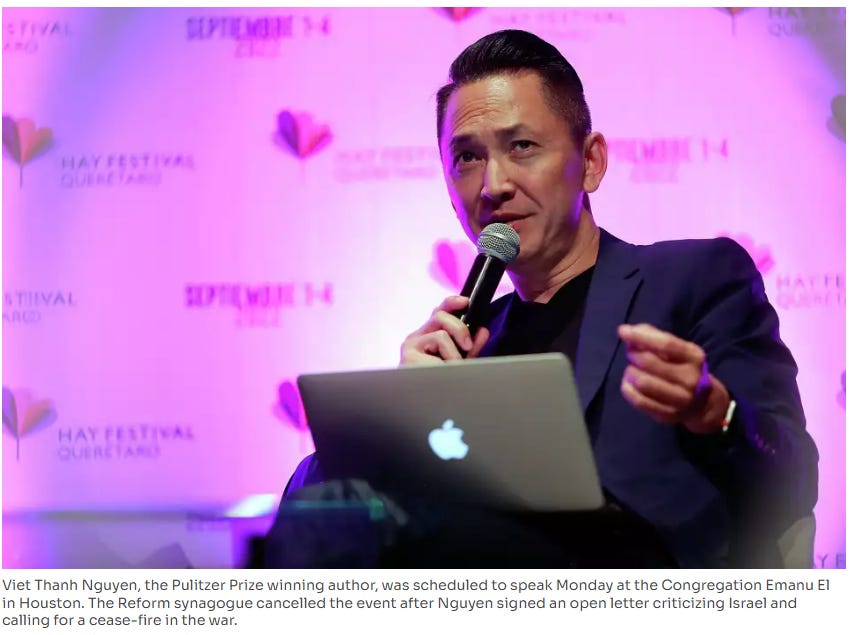
Look, I can go from today, what’s happening now with Viet’s honorable words and stance on Gaza and Genocide, then move backwards, but truly this says it all about cancel culture, Jews, Jewish power, Israel-First millionaires and billionaires, and the zealotry of zionism in the halls of power, money, politics:
“We are joined by the Pulitzer Prize-winning novelist Viet Thanh Nguyen to discuss his new book, A Man of Two Faces: A Memoir, a History, a Memorial. Last week the 92NY, a major cultural institution in New York City, canceled an event with Nguyen after he joined 750+ writers in signing an open letter calling for a ceasefire in Gaza. His memoir explores his family’s personal history as refugees from Vietnam dealing with the impacts of U.S. imperialism. Civilian stories are war stories, too, says Nguyen. He says the U.S.’s greatest acts of anti-Asian violence occur internationally and continue today.”
I see total continuity between what the United States has done in the Philippines, in Korea, in Japan, in Laos, in Cambodia, in Vietnam and now with Palestine.
Well, I can’t hold a candle to all these reviewers’ 300-word blurbs, AKA kudos for the book: Grove Atlantic! Check them out for thos pithy, writerly sorts of punchy reactions to his book.
For me, for the students reading the memoir, and for our discussions, we all can see Viet covers that universal story of being a refugee in land that expects assimulation and genuflection.
A country that is still settler colonial in its proxies and its Projects for a New Hegemony America. Proxies here and subjugation there. He is in the land of the homeless — both the houseless and those with no tribe, no nuclear family, friendships and hopes dashed on the hard walls encircling the American mind
He’s not digging being called a boat person, and his young life in San Jose (first landing in Pennsylvania) is one where he is a man without a solid tribe. He says he was sort of a spy in his parents’ home, since he was not Vietnamese, really, through this process of American (California) schooling, that is, he spoke and read English, and was not interested in some traditional route of work work work until you drop drop drop, Vietnamese or Asian style. He also felt like a spy within his American interactions and various settings as he coursed through life determined to find that face, some new American face, but one that is steeped in Viet Nam.
San Jose!
Viet’s on a whirlwind tour, in book festivals, on the main stage in books stores, at colleges, on the CBS Morning show, on Democracy Now, and he was on that trajectory before signing onto a pretty benign letter asking for a cease fire in Gaza.
“People might like to think the war is done when a ceasefire is signed, but for most people who live through a war, it goes on for decades.”
The Letter in the London Review of Books
An Open Letter on the Situation in Palestine,
We, the undersigned artists and writers based in the EU, the UK and North America, are speaking out to demand an end to the violence and destruction in Palestine.
The deliberate killing of civilians is always an atrocity. It is a violation of international law and an outrage against the sanctity of human life. Neither Israel, the occupying power, nor the armed groups of the people under occupation, the Palestinians, can ever be justified in targeting defenceless people. We can only express our grief and heartbreak for the victims of these most recent tragedies, and for their families, both Palestinians and Israelis.
Nothing can retrieve what has already been lost. But the unprecedented and indiscriminate violence that is still escalating against the 2.3 million Palestinians in Gaza, with the financial and political support of Western powers, can and must be brought to an end. By cutting off vital electricity, food and water supplies; by attempting to displace by force over one million Palestinians from their homes, with no guarantee of return; and by carrying out continual airstrikes against civilians, including those who are attempting to evacuate, the state of Israel is committing grave crimes against humanity. Its allies, our own governments, are complicit in these crimes.
Human rights groups have long condemned Israel’s occupation of Palestine and the inhumane treatment of – and system of racial domination over – Palestinians at the hands of the Israeli state. But we are now witnessing a new and even more drastic emergency. The UN expert Francesca Albanese has warned that Israel’s current actions in Gaza constitute a form of ethnic cleansing. The Israeli historian Raz Segal has described the situation in Gaza as a ‘textbook case of genocide’.
We call on our governments to demand an immediate ceasefire and the unimpeded admission of humanitarian aid into Gaza. We also demand an end to all arms shipments and military funding, supplies that can only exacerbate the humanitarian catastrophe at hand. Although these measures will not be enough to secure true justice, liberation and equality, they represent an urgent and indispensable first step. We plead for an end to all violence, an end to all oppression and denial of human rights, and a path towards a just and sustainable peace for all.
This memoir is narrated by the American Viet and the other Viet, with the voice addressing himself as you, and this book is memorial (for his mother) and history (for his ancestors and his brief life in Viet Nam and who he is as a man, Vietnamese, yes, Vietnamese American.
Well, I grew up in the United States feeling like I had two faces. On the one hand, I felt, living in my very Vietnamese household with my very Vietnamese parents, that I was an American spying on them. And I felt completely American growing up. But then, when I stepped outside of that household and outside of the Vietnamese refugee community into the rest of the United States, I felt like a Vietnamese spying on these Americans. And so I took that feeling of duality, and I infused that into my fiction, into characters, like The Sympathizer, the title — the character of that novel. And, you know, for a long time, I worked out my own emotional complications, having grown up as a refugee in the United States, feeling myself to be an eyewitness to the trauma that my parents underwent. I survived that experience by becoming emotionally numb, by not feeling things, by shutting down and not dealing with what I had seen and what I had felt.
This book is certainly tied to his mom’s amazing persistence and her own downfall, falling several times with nervous breakdowns and then the more permanent memory failings . . . because of the trauma of so much she experienced in Vietnam and as a refugee in a new land. He was on his way as a successful essayist, novelist, college prof before the shit hit the fan.
Gaza, in real time, on TV, blasted onto Telegram, all over the internet, even with Israel’s demons cutting power and cell phone service!
He is critical of American colonialism, and he has not kept his mouth shut about just what this schizophrenic country is, i.e. calling out the hypocrisy of the country, of the times, of the political nature of a society that is led by the lesser (sic) of two evils. He redacted Donald Trump, his name, from the book, as a way of exploring censorship and self-censorship, erasure, how in reality so much of America’s history and dirty laundry and exceptionally violent past/present have been redacted from Americans books and teachings and minds. As Gore Vidal said, we are the United State of Amnesia. Think of agnotology and entertaining ourselves into blind ignorance, into the death of critical thinking, into mental and physical inflamation.
The contradictions and almost bi-polar nature of being a man between two places, or in his case, a man with two faces, demands an unsettling focus on developing self through “the power of the word.”
The word has meant so much to Viet Thahn, so much so that the cancelling of his book talks’ venues has been a double whammy for him, a contradiction, but in line with the reality of the American Nightmare of not just internment camps for people, but the closing of the mind demanded of a superficial, consumeristic, capitalistic society that for more and more people is transactional and filled with the GAD and SAD of broken indidivuals and communities (General Anxiety Disorder and Social Anxiety Disorder).
[Newsflash — Celebrity disgusting voyerism culture splays opportunities for even second level books deals for third tier writers: Britney Spears is thankful to her fans for the success of her new memoir. The Woman in Me was released on Oct. 24 and has sold 1.1 million copies through its first week on sale, according to Gallery Books, a division of Simon & Schuster. The number includes pre-orders, print books, ebooks and audiobooks formats. ]
An aside . . . .
The death of his mother was the opening he had to begin the journey of this part of his life, this memoir.
And so, eventually, though, it came time to write a memoir, after my mother passed away in 2018. And I certainly wanted to write about my mother and her extraordinary life as a refugee, as a survivor, as a successful businesswoman, as a hero who in the end was destroyed by herself, by whatever was happening in her mind. And so there is a memorial for her in this book, as well. And then, finally, there’s a history, because I think it’s hard for me to separate the memoirs of myself and my family and the memorial I’m writing about my mother from the history of Vietnam and the United States, that led to war and that led to us becoming refugees.
The casualties of war are the people, the villages, the cities, the communities, the families, the cultures, the land, and the collective and individual sanity of the people, the survivors. The first casualty in war is, what, truth, or is it the victors (sic) writing the history, or the lies, or the invented drama, the self-absorbed victimhood, blaming the victims for their own dilemma? And today, bold, in your face, perpetrated by the two grand fake democracies — USA and Israel — is becoming yet another force of collective evil so so in our collective faces that many turn away, two-faced, fearful of how deeply our country — our taxes — is responsible for so much trafficked death and destruction.
[ Not that the world outside the USA isn’t just as disgusting as the current leveling of entire families and neighborhoods in Gaza: “The Boko Haram Islamic extremist group launched an insurgency in northeastern Nigeria in 2009 in an effort to establish their radical interpretation of Islamic law, or Sharia, in the region. At least 35,000 people have been killed and more than 2 million displaced due to the extremist violence concentrated in Borno state, which neighbors Yobe.
Nigeria’s President Bola Tinubu, who took office in May, has not succeeded in ending the nation’s security crises both in the northeast and in northwest and central regions where dozens of armed groups have been killing villagers and kidnapping travelers for ransom. ]
I certainly do think that this memoir that I wrote, which is about my life and the lives of my parents, who came to the United States as refugees and who went through 40 years of war and colonization when they were living in Vietnam, those stories I tell in this book, and larger stores about Vietnamese refugees, in general, and about the War in Vietnam, do have a lot of relevance to what’s happening today.
One of the things that I stress in the memoir is that civilian stories are war stories, too. I look at the lives of my parents, who were not soldiers, and how they were deeply affected by war constantly. They were displaced as refugees twice. They had to leave behind an adopted daughter when they fled Vietnam for the first time. My mother had to go to the psychiatric facility in the United States three times in her life, the last time leaving her permanently disabled. And I’ve spent a lot of time thinking about how the ramifications of war are oftentimes very visible for soldiers, because when we think about wars, we generally think of wars, soldiers, battles, tanks and so on, but the fact of the matter is that wars usually kill more civilians than soldiers.
And civilians bear enormous burdens, both of violence but also of ongoing trauma in the years afterwards. And that trauma is also then passed on to their families, to their children. I grew up witnessing how the Vietnamese refugee community in the United States was a traumatized community that had a very hard time dealing with its past. It was oriented towards look to the future, becoming American, and then having the unspoken consequences of the war rippling through the family and the community.
And probably the last thing to say here is that when Vietnamese Americans become Americans, it’s certainly part of the narrative of the so-called American dream, of which I’m very critical in the book, but part of the complication for me is that, you know: What does it mean to come as a refugee to the United States and then become a part of a country that is a military-industrial complex and is a settler colonial society? That’s a contradiction that I try to work through in the book.
It’s a rocky row to hoe, for sure, being a professor at UCLA, in a state that is a major Military Industrial Complex purveyor of pain and death; the state with that ugly surveillance location, Silicon Valley, plaguing the earth, man, plaguing it; and then the entire Hollywood Propaganda Industry and LaLaLandia nature of the Disneyfication of humanity.
Everything I think about California (I was born in San Pedro) can be put on that one of a million stories of disenfranchisement and racist theft. Chavez Ravine:
During the early 1950s, the city of Los Angeles forcefully evicted the 300 families of Chávez Ravine to make way for a low-income public housing project. The land was cleared and the homes, schools and the church were razed. But instead of building the promised housing, the city — in a move rife with political controversy — sold the land to Brooklyn Dodgers baseball owner Walter O’Malley, who built Dodger Stadium on the site. The residents of Chávez Ravine, who had been promised first pick of the apartments in the proposed housing project, were given no reimbursement for their destroyed property and forced to scramble for housing elsewhere.
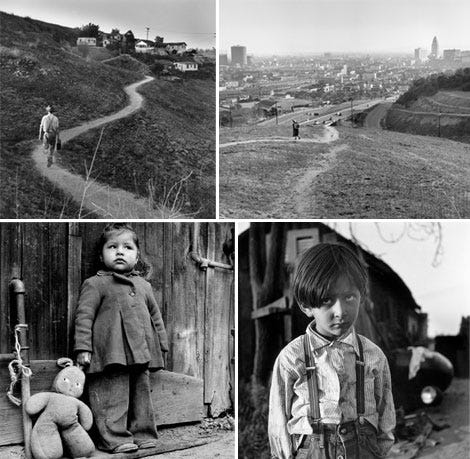
And, now, San Jose, Vietnam Town or Little Saigon, what a flippancy:
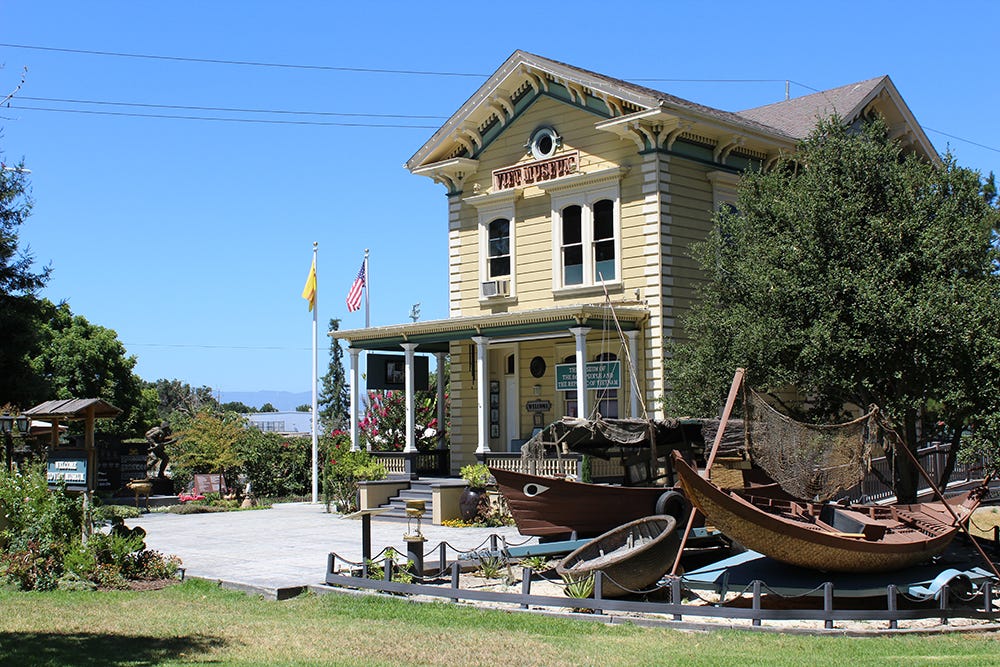
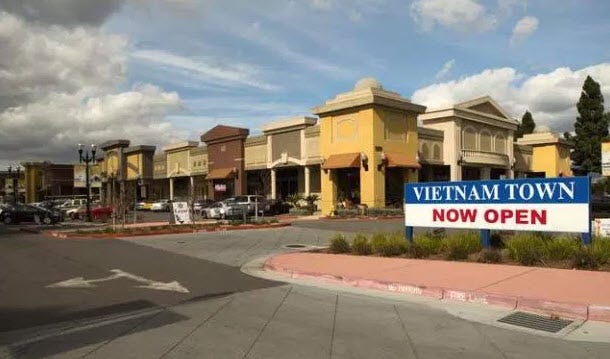
Oh, Vietnam! The one I visited, my images:
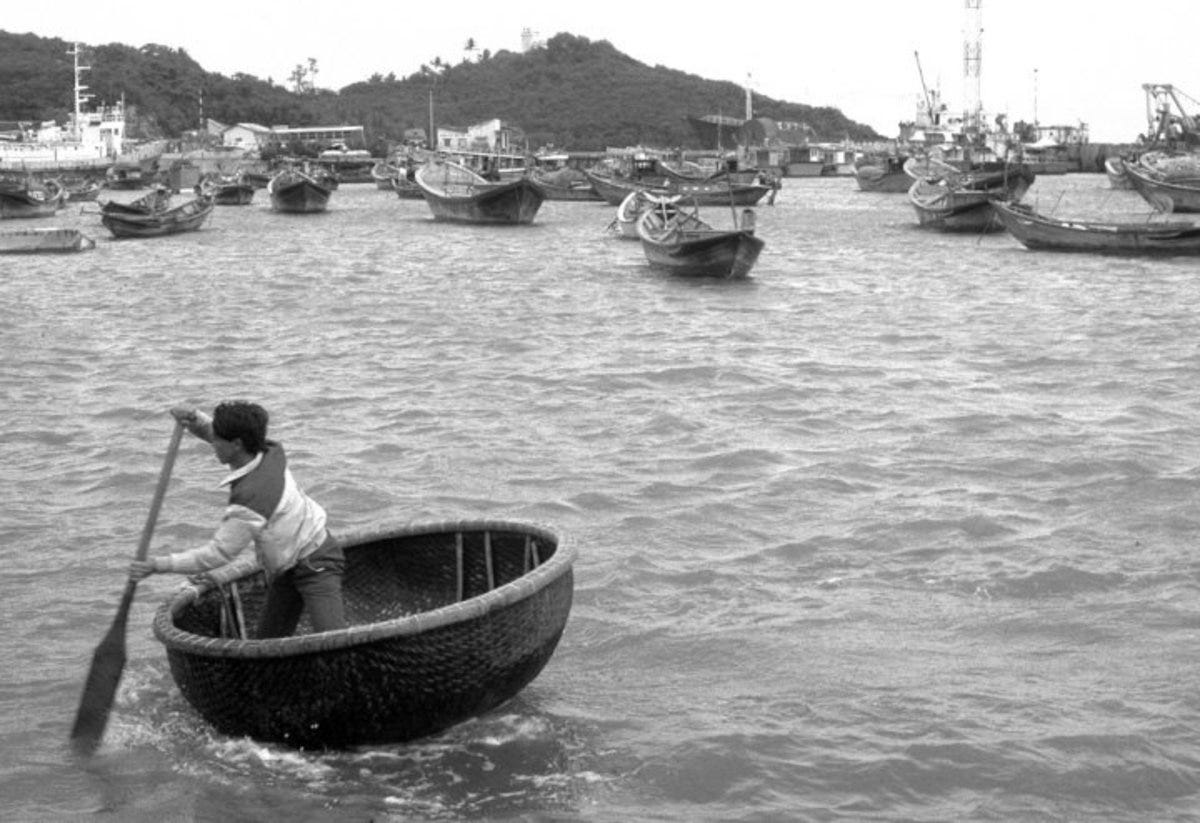
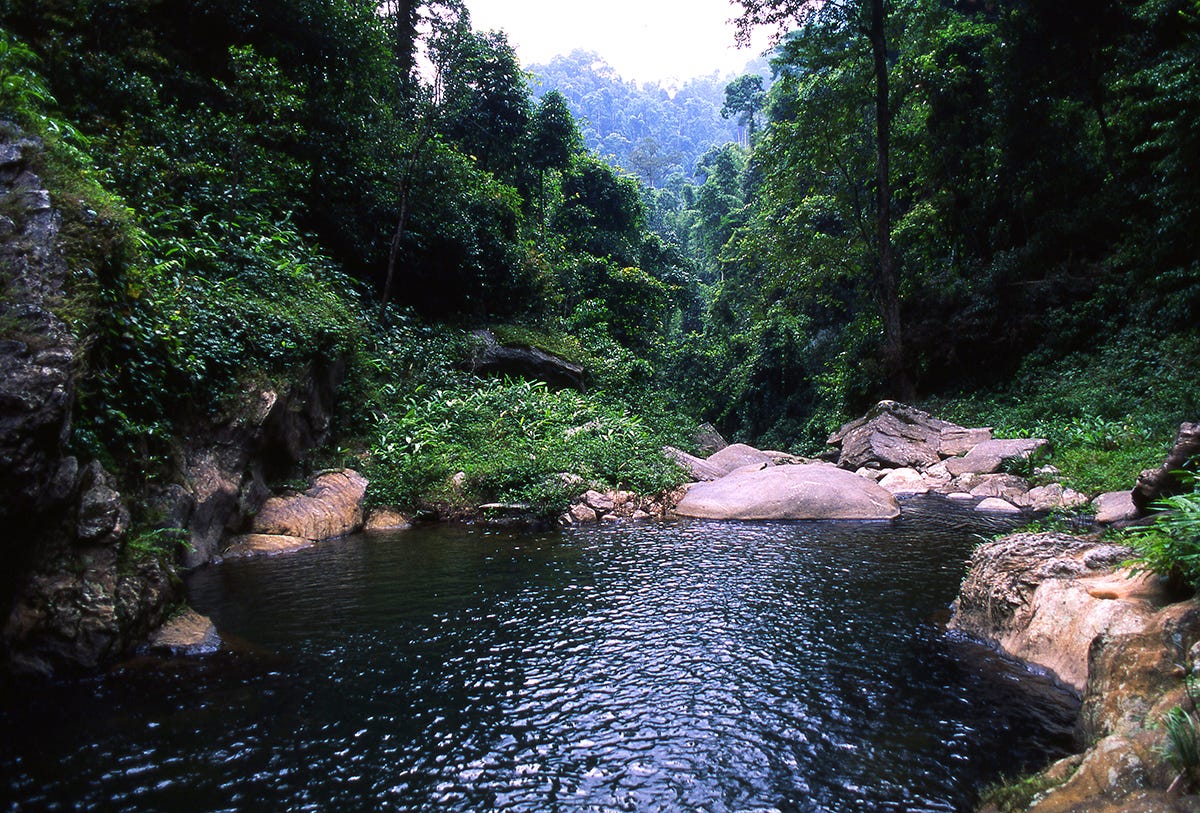
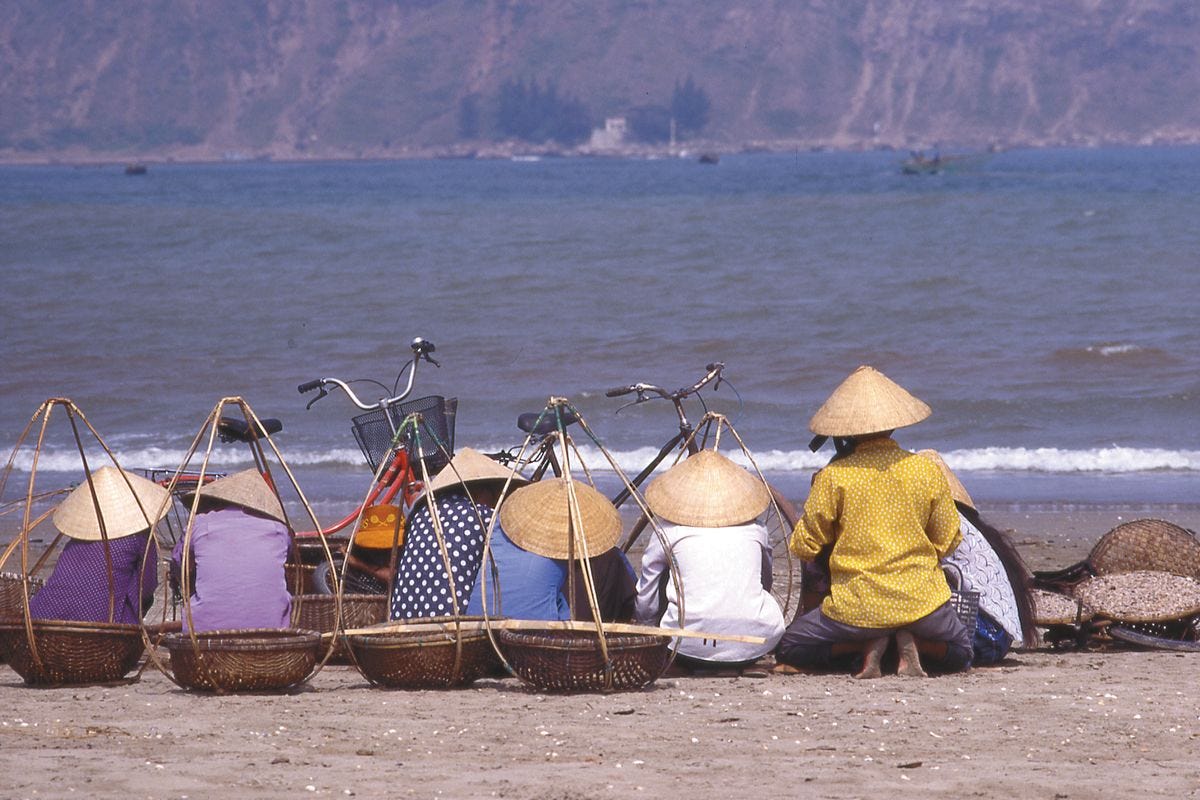
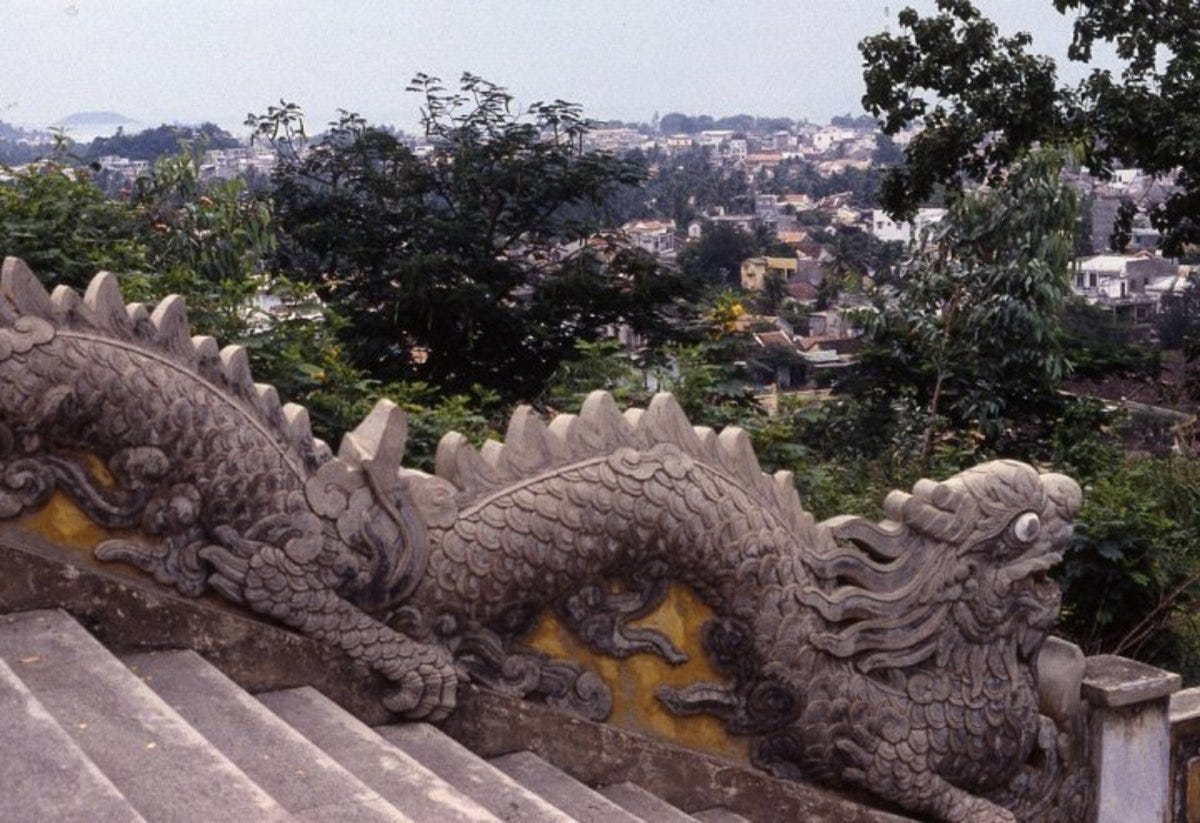
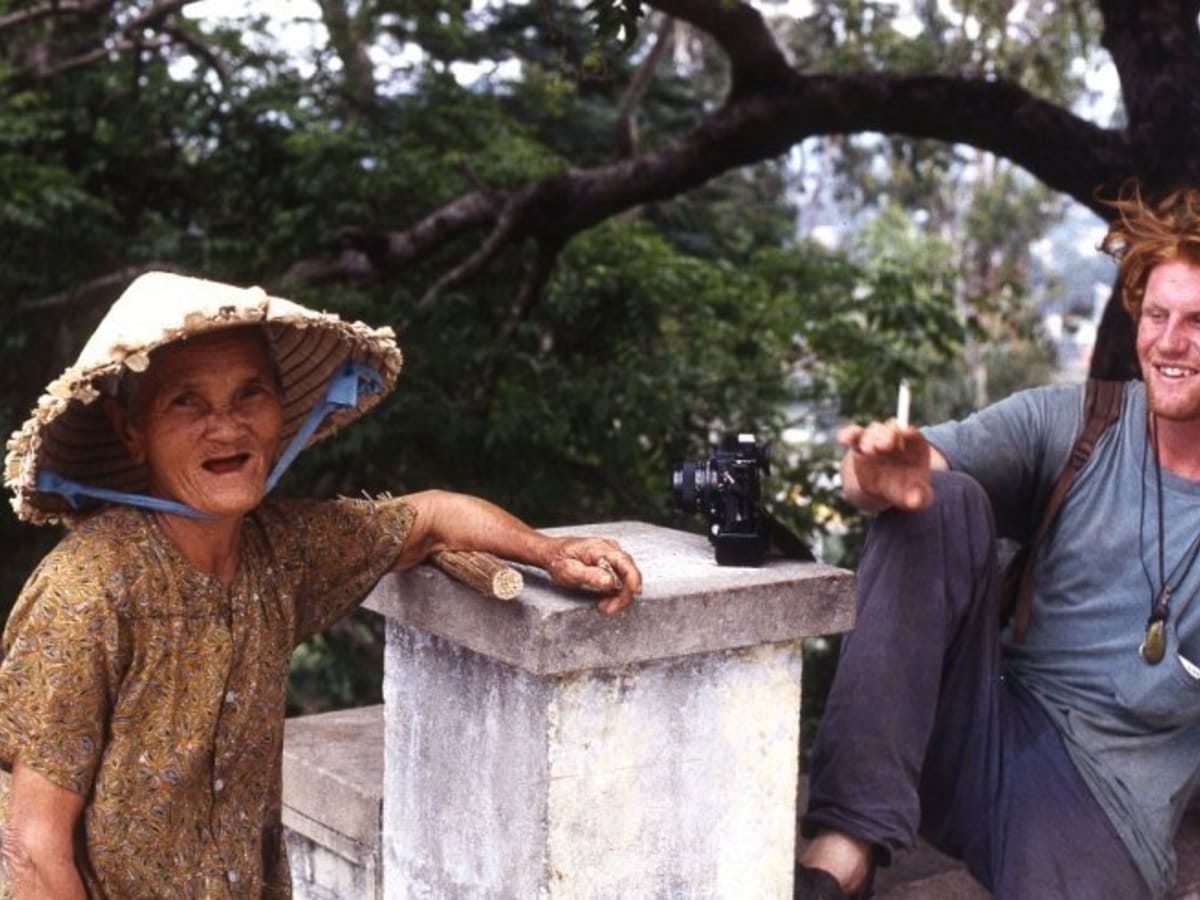
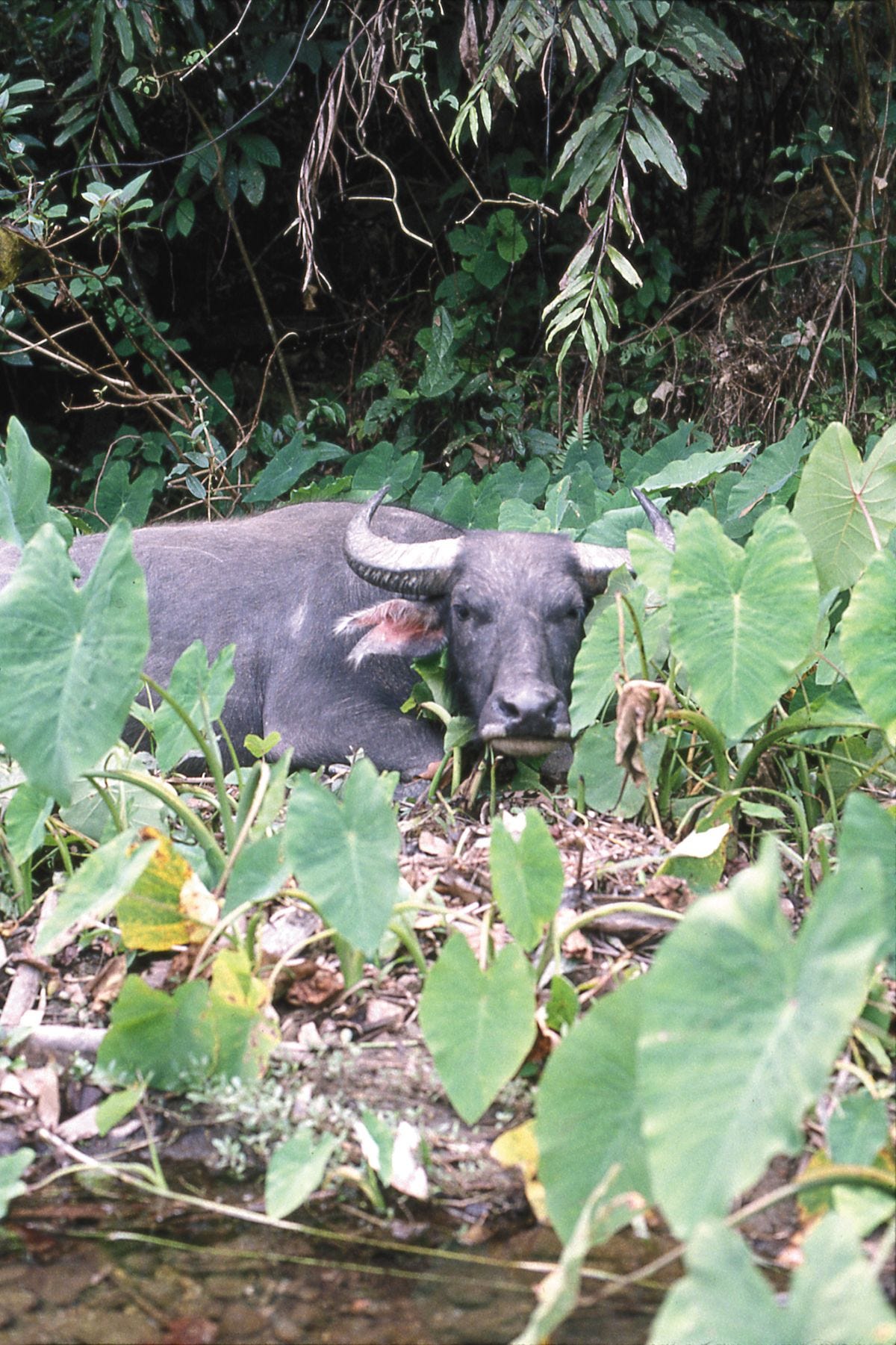
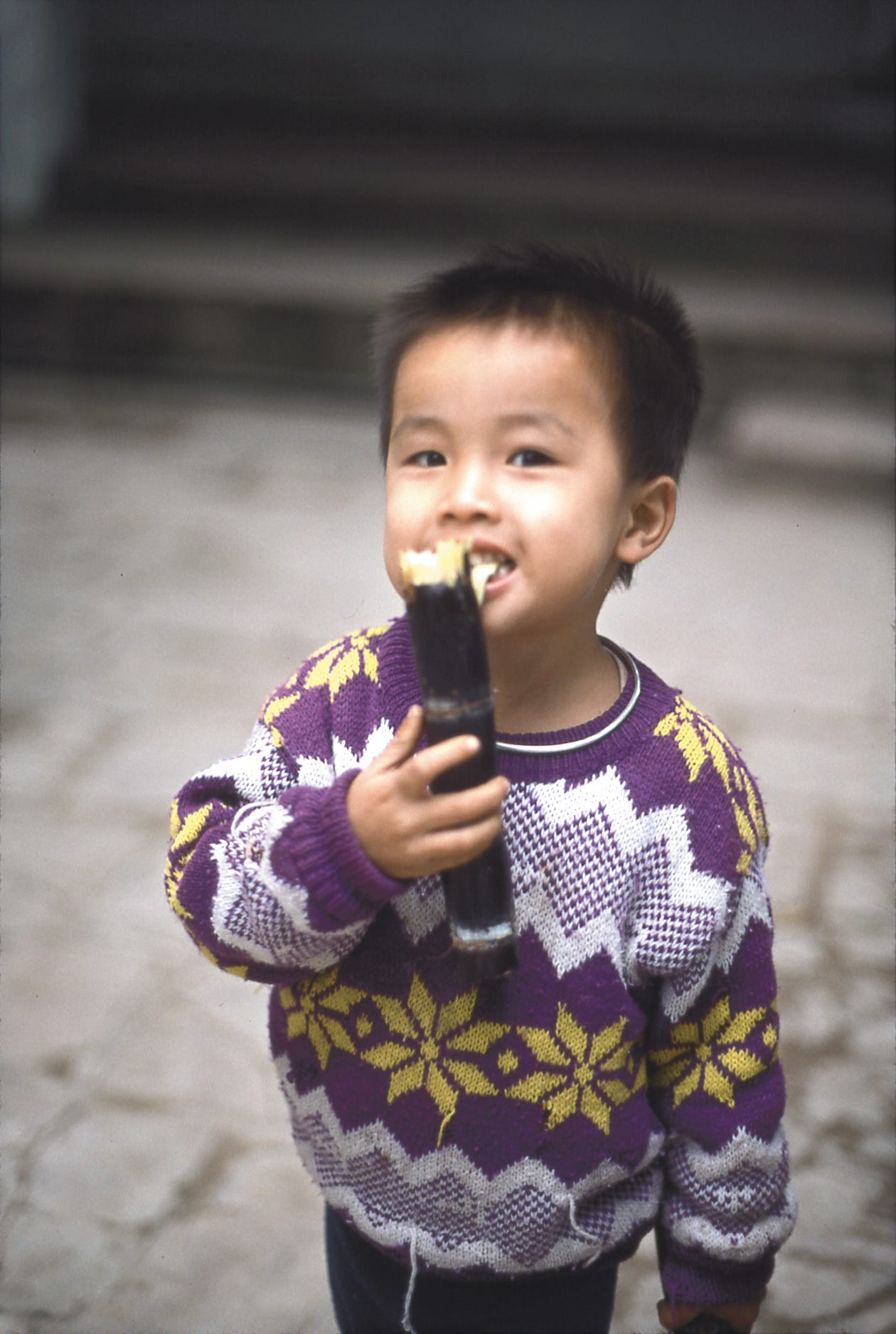
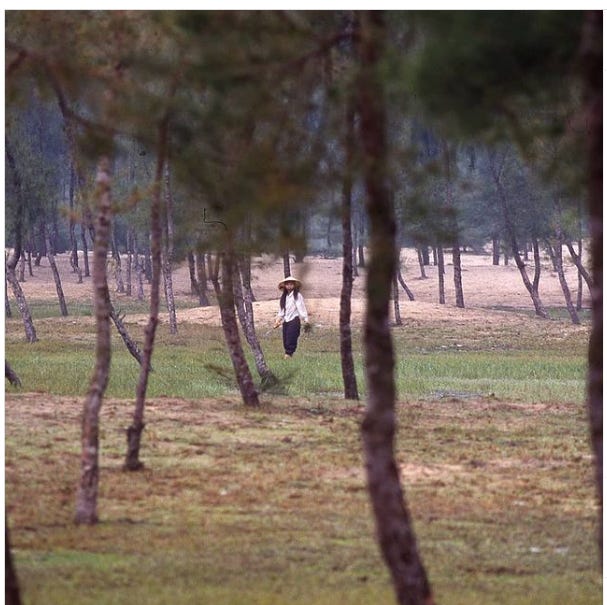
Review to be continued!!!!!!!!!!!!!!!!!!!!!!!
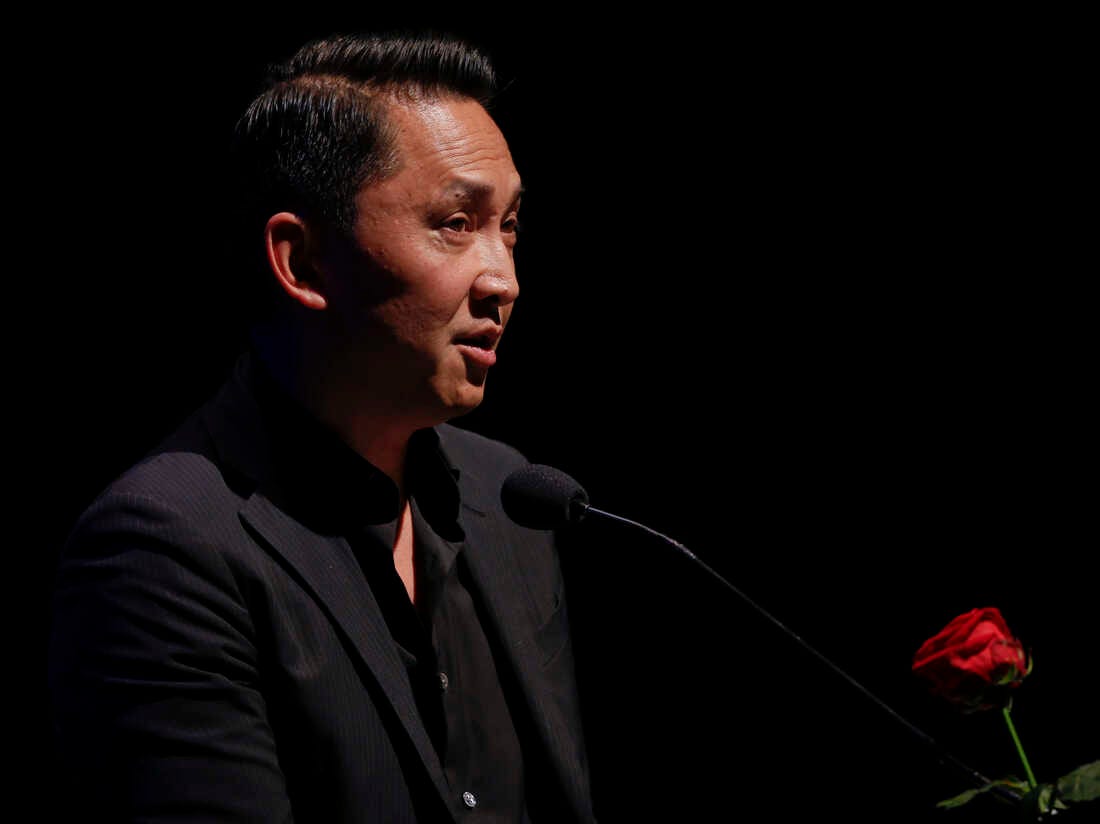
A few hours before the reading was set to take place, a spokesperson for 92NY said the event was “postponed.”
In a statement sent to NPR, the 92NY spokesperson said the center has always invited diverse viewpoints. “As a Jewish organization we believe the responsible course of action right now is to take some time to determine how best to use our platform and support the entire 92NY community, so we made the difficult decision to postpone the October 20th event.”
Nguyen instead held the event at the McNally Jackson bookstore in Manhattan.
The poetry center’s director Sarah Chihaya and senior program coordinator Sophie Herron confirmed to NPR that they both resigned from their posts following the cancellation of Nguyen’s event, but did not comment further.
The 92nd Street Y, New York’s Unterberg Poetry Center has been a hub for literary events and readings since 1939. It has a long history of hosting canonical writers such as T.S Eliot, Langston Hughes, Marianne Moore, to more contemporary authors such as Sandra Cisneros and Lorrie Moore.
When contacted by NPR, Nguyen said he hasn’t been in touch directly with the board or any spokespersons from 92NY. On Instagram, he wrote:
“I have no regrets about anything I have said or done in regards to Palestine, Israel, or the occupation and war.”
And so the rest of the poetry season is cancelled. Now the rest of the 92NY’s poetry reading season – which was set to feature Emily Wilson, Roxane Gay, Tracy K. Smith, and more – is “currently on pause,” according to a 92NY spokesperson.
Pause … another word for censored, stopped, derailed, cancelled, imploded, sanctioned, forced into submission!










